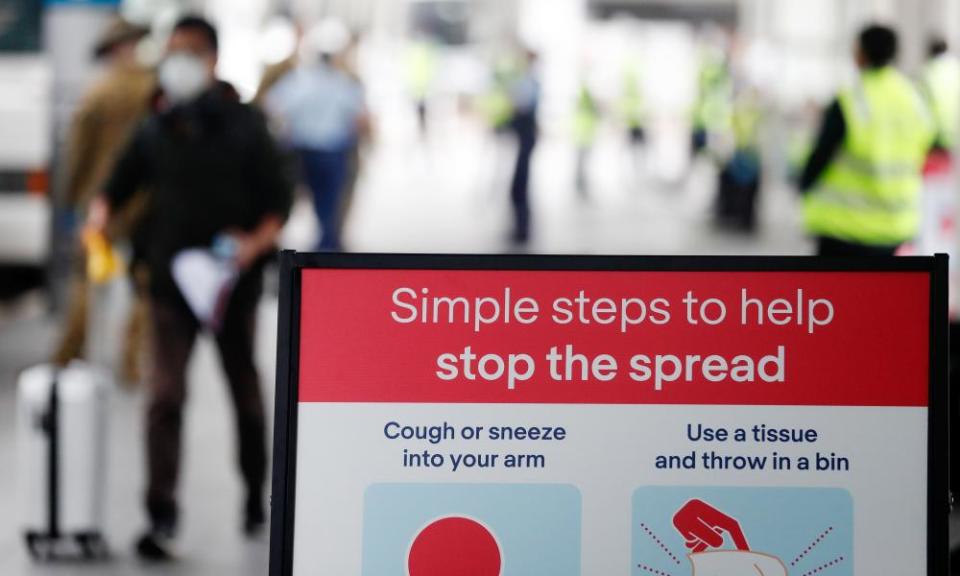'Unethical': Australians trying to fly home claim airlines cancelling economy tickets to sell more first-class seats

Australians attempting to return home are complaining that international airlines are cancelling tickets of economy customers in order to offer more business and first-class seats, as operators look to boost profitability while complying with Australia’s strict passenger arrival caps.
The accusations against several international airlines, which have been made since the caps were introduced and then tightened in July, have been denied by several operators.
However the Guardian has heard several call centre staff admit to customers that despite being told their flights had been cancelled, they were still flying as scheduled, and could repurchase seats on the flight if they paid for a higher class airfare.
Related: Virgin Australia announces 3,000 job cuts and says there may be more
The Guardian understands that at least one airline, Emirates, will only accept 19 economy seat bookings on flights from Dubai into Sydney, reserving more seats for business and first-class sections.
The concerns over the cost of airfares for Australians comes after the new owners of Virgin Australia, Bain Capital, announced 3,000 of its 9,000 employees would lose their jobs, and its budget carrier, Tiger Air, would be discontinued, as the impact of Covid-19 continues to wreak havoc on aviation.
While the passenger caps for Australian airports – designed to ease pressure on quarantine hotels for returning international travellers – have fluctuated since their introduction, a Department of Infrastructure, Transport, Regional Development and Communications told the Guardian that Sydney airport is limited to 350 international arrivals per day.
Perth’s cap is 525 international passenger arrivals per week, or 75 per day, while Brisbane’s is 500 per week, or roughly 70 per day.
For Sydney airport, where there are between six and nine scheduled international arrivals most days, but up to 12 this coming Saturday, the daily arrival cap can change from as many as 60 passengers per flight to as few as 30, with last-minute cancellations or delays often meaning actual capacities per flight can change with little notice.
A department spokesman said no airlines had so far breached the caps, which are set to be reexamined for extension by national cabinet on Friday before they expire on 8 August.
The Guardian has been contacted by several travellers concerned about the impact the rule was having on airfare prices, with some Australians travelling overseas briefly for compassionate reasons (anyone exiting Australia still requires an exemption, granted only for specific reasons) opting for business-class seats in the hope of having uninterrupted return itineraries.
While most airfares into Australia initially soared after the introduction of the passenger caps (Qatar Airways, one of the few airlines still operating, offered a one-way economy ticket from Doha to Sydney for A$3,729 in July) prices have slightly lowered, with the ticket now offered for A$2,300.
Related: 'Very uncertain': passengers scramble for limited seats on flights to Australia
While the main airlines still flying into Australia – including Qatar, Etihad and Singapore Airlines – have all denied prioritising business or first-class passengers to meet the caps, the Guardian has spoken with an Australian family living in the UK trying to permanently move back to Sydney who were told their return flight this week had been cancelled and had been placed on a replacement flight two weeks later.
The family, who has requested anonymity out of concern of being moved off their replacement flight, had purchased four economy tickets that transited through Dubai.
After visiting the Emirates website to search for an earlier replacement flight, they saw they could still buy four tickets for their original flight, with the same departure date and time, but only in first class. The one-way tickets would cost them more that £15,000 (more than A$27,000).
“We were wondering why it was cancelled?” the family’s father asked during a call to Emirates support line. “Are you aware that you’re still selling tickets on your website for four adults?”
One operator responded: “Indeed, there are flights as you can see (on that date) ... now the thing is ... I only see business or first class available, I don’t see any economy. I’m trying to understand it.”
The father responded that “it feels a little unethical that we were taken off but that there’s still a bunch of tickets available for [the flight] today”.
“It’s looking like we were taken off to sell higher-price tickets.”
In a subsequent call, an operator told the family “the capacity of the aircraft for economy class is 19”, and said even after the family had been moved off the flight, economy was still “overbooked” by two seats when the airline was offering business and first-class tickets online, suggesting it would remove two further economy passengers who had already been assigned seats if two, more expensive class seats were purchased before the flight’s departure.
The Guardian has seen booking and cancellation notifications verifying the family’s claims.
An Emirates spokesman denied the airlines had been removing economy passengers from flights into Australia they had booked if a higher-class ticket was subsequently sold.
He said Emirates had “adopted a balanced approach to seat allocation”.
“We continue to follow the Australian government’s directive to restrict capacity on all inbound international flights until 8 August 2020,” the spokesman said.
“Despite the capacity restrictions, in most cases a large portion of our seats are allocated to economy class travellers with the remainder allocated to first and business class travellers,” adding that the proportion “varies for each flight”.
Do you know more? Contact elias.visontay@theguardian.com.

 Yahoo News
Yahoo News 